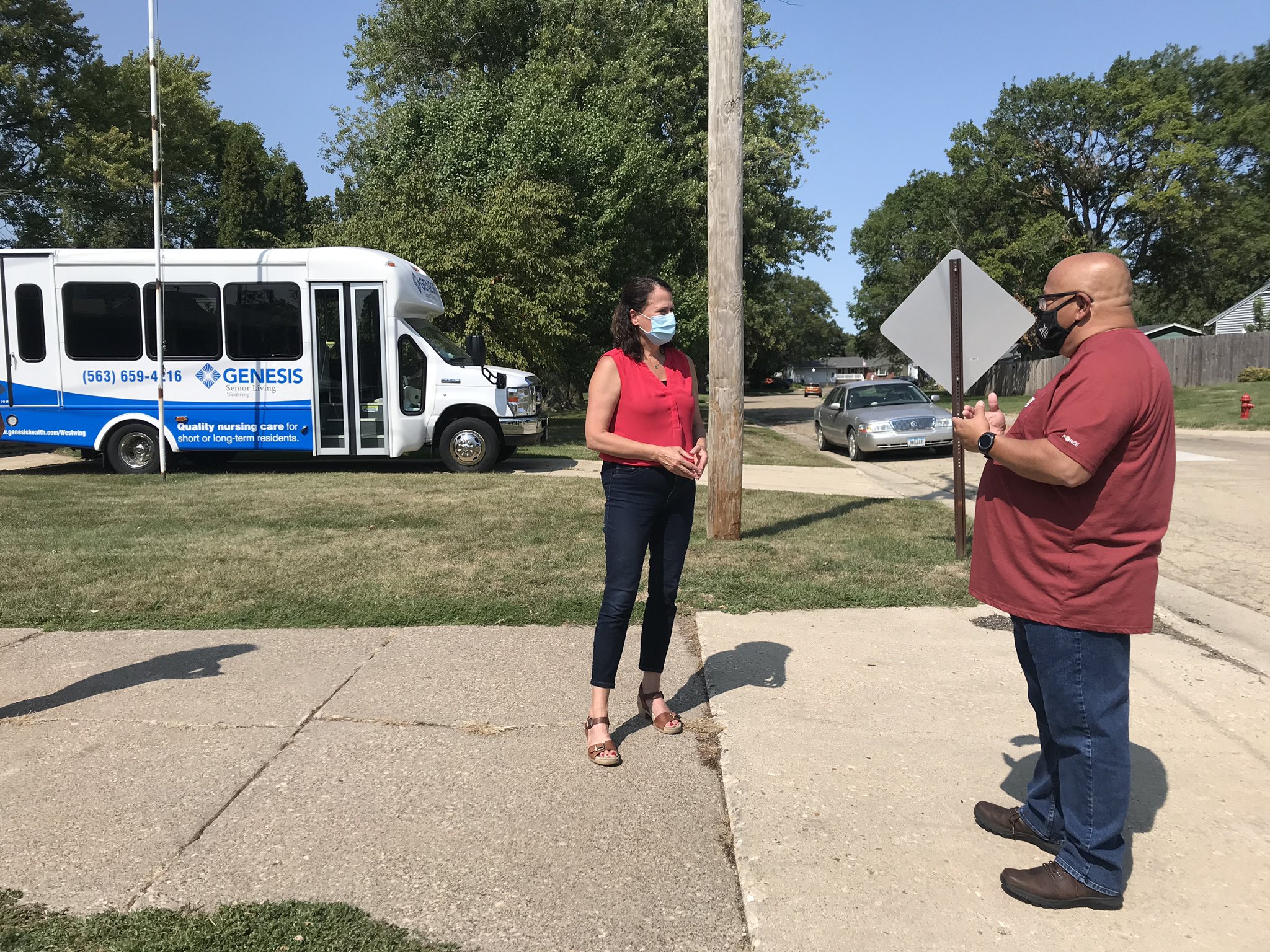Key actions and positions posted on the intersection of disability and education, jobs, immigration, climate crisis, criminal justice and more

Des Moines, IA, Sept. 11 – Democratic Senate candidate Theresa Greenfield has responded to a detailed candidate questionnaire on disability issues. The questionnaire is from RespectAbility, a nonpartisan nonprofit disability organization that does not endorse candidates. The questionnaire is purely for educational purposes. RespectAbility has reached out to key Senate and gubernatorial campaigns on both sides of the aisle and will be posting all responses on The RespectAbility Report. The full text of RespectAbility’s questions and Greenfield’s responses follows:
1. Learning during the COVID-19 pandemic has led to more issues and concerns for all students and their families, but this is especially true for students with disabilities. Additionally, the gap in graduation and drop-out rates between students with and without disabilities continues to undermine their futures. For example, in the class of 2018, only 66 percent of Black students with disabilities, 71 percent of Hispanic students with disabilities, 77 percent of white students with disabilities, and 79 percent of Asian-American students with disabilities completed high school. Furthermore, just seven percent of students born with a disability graduate from college. What is your plan for ensuring that all students with disabilities receive a quality and appropriate education to acquire the critical and marketable skills necessary to compete in a job-driven economy?
As the mother of a son with a disability, this is personal to me. I support fully funding the federal share of the Individuals with Disabilities Education ACT (IDEA). The federal share of IDEA funding is now less than 14 percent, far short of the 40 percent Congress promised to provide. This is especially important because the failure to fund IDEA fully has shifted costs to the states, forcing them to choose between raising taxes and cutting critical services. Congress should also lift the budget caps and increase funding for Title I programs for the students most in need, Title II funding for teacher development, IDEA funding for students with disabilities, and community schools.
2. In the economic expansion prior to the COVID-19 pandemic, the national employment rate for working-age people with disabilities in America was 37.6 percent compared to 77.8 percent of people without disabilities. Further, there continues to be significant disparities in employment outcomes within the disability community, which varies from state to state. There are significant racial disparities in disability employment outcomes. 38.9 percent of working-age white people with disabilities have jobs compared to only 29.7 percent of working-age Black people with disabilities had jobs, 39.4 percent of working-age Hispanics with disabilities and 43.2 percent of working-age Asian-Americans with disabilities. The pandemic has ravaged the disability community and more than 1 million workers with disabilities have lost their jobs. If elected, what will you do to ensure that the government is removing barriers and promoting high quality, inclusive services built on evidence-based policies, practices and procedures leading to competitive, meaningful careers, which includes promoting entrepreneurial opportunities?
We need leaders who will follow and trust the science, while recognizing and taking action to address systemic racism and discrimination in housing, employment, policing, education and so much more.
3. The disability community fundamentally believes in the need to ensure “Nothing about us, without us” – real inclusion and places at decision making tables – because we know solutions that work and want to be a part of making our communities stronger. What specific measures have you taken to make your campaign accessible for, and inclusive of, people with disabilities, as every issue impacts our lives?
I share this important belief. One way our campaign is promoting this value is by captioning our videos, to ensure accessibility for people who are deaf or hard of hearing. We also made sure our office is wheelchair accessible.
4. RespectAbility published Disability in Philanthropy & Nonprofits, based on our study on the levels of disability inclusion in the social sector across the country. This largescale study found significant data showing that nationwide, organizations overall want to be inclusive, but are unintentionally excluding the one-in-five people with disabilities. What will you do to promote policies and practices designed to support full community engagement, access and inclusion of people with disabilities?
As a U.S. Senator, I will speak out and attend community events designed to engage on these issues and promote access, inclusion and more opportunities for people with disabilities.
5. Elected officials have multiple opportunities to demonstrate a strong commitment to diversity and inclusion, full community participation and celebrating the contributions and accomplishments of people with disabilities through press releases, speeches, celebratory events including National Disability Employment Awareness Month. There are significant stigmas that create attitudinal barriers that limit options and perpetuates low expectations for people with disabilities. What measures will you take to combat these stigmas and promote opportunities for people with disabilities?
As a U.S. Senator, I will continue to speak out about the importance of fully funding IDEA and will participate in events and make statements to acknowledge the importance of National Disability Employment Awareness Month.
6. In our nation’s public schools, there are 6.3 million students with disabilities. The changing demographics of America are reflected in these students, with 11.4 percent of students with disabilities nationwide, almost 720,000, also identified as English-language learners. Their accommodation needs are compounded by the fact that many come from households that do not speak English at home, adding an extra challenge for parental interaction. It can also be harder to diagnose disabilities in children when they are English language learners. Additionally, immigration issues and fears over the public charge rule impact students with disabilities, their families and the wider workforce. What policies would you advance to enable students and their families who are English language learners with disabilities to succeed in school and employment?
All of our students deserve the education and training they need to follow their dreams. I think the best way to do that is to protect our public schools and ensure they have the resources they need to teach all of students including people with disabilities and students who are learning English as a second language. As U.S. Senator, I support making sure public dollars stay with public schools and we nominate a new U.S. Secretary of Education with public school experience who shares these values.
As the mother of a son with a disability, I saw firsthand how difficult it can be to navigate school systems. This is personal to me.
7. Housing, criminal justice, climate issues, transportation and every other area have significant impacts on people with disabilities. What additional policies and priorities, other than those already discussed above, do you plan to focus on to improve the lives of people with disabilities?
In addition to expanding education and job opportunities, I also support criminal justice reforms and expanding investments in mental health services so we can limit the burden on our criminal justice system and make sure people with disabilities get the care they need.
Greenfield, an Iowa businesswoman and former Congressional candidate, is facing off against incumbent Republican Sen. Joni Ernst in this year’s closely watched election for the U.S. Senate. RespectAbility has contacted the Ernst campaign about completing our nonpartisan questionnaire multiple times via email and we currently are waiting to receive their response.
RespectAbility is a nonprofit, nonpartisan organization that fights stigmas and advances opportunities so people with disabilities can fully participate in all aspects of their communities. RespectAbility does not rate or endorse candidates. View more coverage of 2020 candidates.

[…] Read Response in Full […]